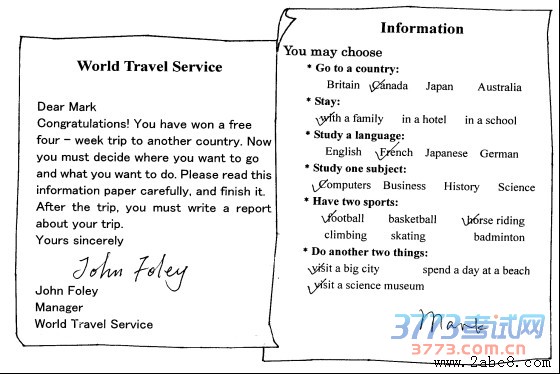IV.补全对话 阅读对话,选择最佳答案完成对话。 ( 5分)
A: There is going to be a football match tomorrow evening. 51
B: I’d like to. 52
A: About two hours.
B: OK.
A: Well, 53 I want to invite you to play tennis with me.
B: Sorry, 54
A: That’s too bad. Maybe another time.
B: You can ask Tom. 55
A: OK.
( )51. A. Do we have to watch it? B. Do you often watch football games?
C. Can you come to my party? D. Would you like to go to watch it with me?
( )52. A. How long does it take? B. How far is it?
C. How often do you watch TV? D. How do we get there?
( )53. A. what does your father do? B. what are you going to do this Saturday?
C. who are you going with? D. what does he look like?
( )54. A. I like sports very much. B. when is it?
C. I have to practice the guitar. D. what are you doing?
( )55. A. He likes playing tennis. B. He is more outgoing than me.
C. I am better at sports than him. D. He doesn’t like playing tennis.
V.完形填空 阅读短文,从每题A、B、C、D四个选项中,选出一个能填入文章中相应空白处的最佳答案。 ( 10分)
One day a girl and a boy went to have a picnic outside the city. There were lots of tall old buildings there.
After a while, they 56 a secret laboratory (实验室). They went into it and 57 a strange machine. They turned on it and the machine made the boy become the 58 of a marble (子弹). The children tried to change this action, 59 couldn’t do it, and couldn’t find anyone to help.
The girl 60 her friend and put him in her backpack to take him home. The backpack was very messy and full of all kinds of things, so the journey home was just 61 for the boy. The boy couldn’t do anything but cry.
When the girl 62 to get him out of the bag, things were so messy that she couldn’t find him. She tried many 63 but failed. So she decided to take away everything, one by one. Thanks to this way, she found her friend 64 .
Both children learned the importance of 65 things in order, even inside a backpack. The next day they went back to the laboratory, there a kind worker returned the boy to his normal size.
( )56. A. dreamed B. knocked C. saw D. made
( )57. A. found B. met C. built D. took
( )58. A. name B. color C. size D. place
( )59. A. and B. so C. or D. but
( )60. A. got up B. picked up C. turned up D. looked up
( )61. A. surprised B. interested C. bad D. excited
( )62. A. tried B. stopped C. forgot D. hated
( )63. A. plans B. ideas C. ways D. times
( )64. A. at last B. at first C. on time D. as well
( )65. A. taking B. keeping C. showing D. leaving
VI.阅读理解 阅读下列短文,从每题A、B、C、D四个选项中,选出一个能回答所提问题或完成所给句子的最佳答案。 ( 15分)
(A)

( )66. How long will Mark’s trip last? ________
A. Four weeks. B. Two months. C. About a year. D. We don’t know.
( )67. From the letter, we know John Foley ________.
A. is a traveler B. is the head of World Travel Service
C. likes writing letters D. likes going to foreign countries
( )68. Mark ________.
A. must write a report after the trip B. is going to study Japanese during the trip
C. will pay for the trip D. should have some sports before the trip
( )69. Mark doesn’t live in ________.
A. France B. Britain C. Australia D. Canada
( )70. Mark will probably (很可能) write something about ________ in his report.
A. a day at a beach B. a science museum
C. business in that country D. basketball in that country
(B)
What do you do when you feel unhappy? Do you listen to music? Do you talk to a friend?

Maybe next time you feel sad, you should try going outside ... if it is sunny. Doctors know that how much sunlight we get can change how we feel. Scientists learned this by interviewing people who live in different parts of the world. In the far north, in Alaska or Finland, for example, the days are very short in the winter. People living in these places say that they often feel unhappy in the winter. In the south, where there are more daylight hours, fewer people say they are unhappy in the winter. The reason is the amount (数量)of sunlight these people get each day. Sunlight changes the chemicals (化学物) in our bodies, and these chemicals can change the way we feel. A couple of hours of strong sunlight or light from a special lamp can help your body make the chemicals that make us feel happy.
Another way to feel happier is to get some exercise. Just like sunlight, regular exercise helps our bodies make certain chemicals, which make us feel happier. In addition, exercise helps people sleep better and lack of sleep often makes people feel unhappy. Exercise also helps you get rid of stress. When you are angry or upset about something, exercise is a good way to get those bad feelings out of you.
( )71. Why do people in the far north feel unhappy more often than people in the south?
A. Because they can’t go outside. B. Because they get less sunlight.
C. Because the weather is too cold. D. Because the summer is too short.
( )72. How can sunlight change the way you feel? ________
A. On a sunny day, you can play outside.
B. Sunlight makes you less tired.
C. Sunlight increases your body temperature.
D. Sunlight helps your body make certain chemicals.
( )73. What’s the main point of Paragraph 2? ________
A. It is better to live in the south. B. Southern people feel much happier.
C. Sunlight can control our feelings. D. Northern people often feel unhappy.
( )74. ________ will not make you feel happier according to the passage.
A. Eating more B. Exercising more
C. Getting more sleep D. Getting more sunlight
( )75. What is the best title for this passage? ________
A. Why Is Sunlight Good for You? B. How Can Exercise Help You?
C. Ways to Feel Happier D. Functions of Exercising More
(C)
“How are you?” is a nice question. It’s a friendly greeting that people in the United States use. However, “How are you?” is also an unusual question. It’s a question that often doesn’t need an answer. The person who asks, “How are you?” expects to hear the answer “Fine,” even if the person isn’t fine. The reason is that “How are you?” isn’t really a question and “Fine” isn’t really an answer. They are common ways of saying “hello” or “hi”.
Sometimes, people don’t say exactly what they mean. For example, when someone asks “Do you agree?” the other person may be thinking, “No, I don’t. I think you’re wrong.” It isn’t polite to disagree very strongly, so he might say, “I am not so sure.” This is a nicer way to say that you don’t agree with someone.
People also don’t say exactly what they are thinking when they finish talking to other people. For example, many conversations over the phone end when one person says, “I’ve got to go now,” or the person who wants to hang up gives an excuse such as “Someone is at the door,” or, “Something is burning on the stove.” The excuse may be real, or not. The person who wants to hang up simply doesn’t want to talk any more, but it isn’t polite to say so. An excuse is polite, and it doesn’t hurt the other person’s feelings.
Whether they are greeting each other, talking about an opinion, or ending a conversation, people often don’t say exactly what they are thinking. This is one way of being nice to people, and it’s a part of the game of language.
( )76. If you have a different idea from that of someone else, it is polite to say “________.”
A. You’re wrong B. I’m not so sure
C. Of course, I disagree D. No, I don’t agree with you
( )77. Which of the following is a polite way to finish a conversation? ________
A. I have no time to talk to you now. B. I want to stop talking now.
C. I have to go now. D. I don’t want to talk any more.
( )78. According to the passage, when a person says “Something is burning on the stove,” it
means that ________.
A. he is going to prepare an exam
B. he is interested in the conversation
C. he is hurting someone’s feelings
D. he’s giving an excuse to end the conversation
( )79. One of the rules of the game of language is ________.
A. to be polite B. not to disagree with others
C. to say what you mean D. to make sentence funny
( )80. What’s the passage mainly about? ________
A. How to make friends with other people.
B. Some polite questions used to greet other people.
C. Important ways of being polite to other people.
D. How to end a conversation.
第II卷 (非选择题 共40分)
注意事项:
1.第II卷为非选择题,请考生用蓝、黑色钢笔(签字笔)或圆珠笔直接在试卷上作答。
2.答卷前,请考生将姓名、准考证号、座号填写在试卷规定的位置。
VII.根据句意和所给音标,写出正确单词,将句子补充完整。( 5分)
81. ____________ /sæd/ movies make us cry.
82. Families also play an important ____________ /rəʊǀ/ in education.
83. –How much should he pay?
–That’s up to him to ____________ /dɪ'saɪd/.
84. –Did you do anything ____________ /fæn'tæstɪk/ last weekend, Alice?
–Yes, I did. I went surfing with my cousin.
85. –Do you know Voice of China? That’s my favorite ____________ /'prəʊgræm/.
–I like it, too. I often watch it on TV.